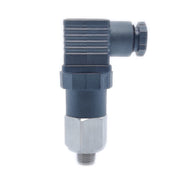Pressure sensors are vital components used in a wide range of industries, including automotive, aerospace, medical, and manufacturing. They are used to measure pressure and convert it into an electrical signal, which can be read by electronic systems. Understanding how pressure sensors work and how to select the right one for your application is crucial to ensure accurate and reliable measurements.
In this comprehensive guide, we will explore the different types of pressure sensors available and how they work. We will also discuss key factors to consider when selecting a pressure sensor, including accuracy, sensitivity, and response time. Finally, we will introduce XIDIBEI, a leading manufacturer of pressure sensors, and highlight their product offerings.
Types of Pressure Sensors
There are several types of pressure sensors, including:
-
Strain Gauge Pressure Sensors: Strain gauge pressure sensors work by measuring the strain on a diaphragm caused by the pressure applied to it. This strain is converted into an electrical signal that can be measured and recorded.
-
Capacitive Pressure Sensors: Capacitive pressure sensors work by measuring the change in capacitance between two plates as the pressure changes. This change in capacitance is converted into an electrical signal that can be measured.
-
Piezoelectric Pressure Sensors: Piezoelectric pressure sensors work by converting the pressure applied to them into an electrical charge. This charge is then measured and recorded.
-
Resonant Pressure Sensors: Resonant pressure sensors work by measuring the change in the resonant frequency of a sensor element as the pressure changes. This change in frequency is converted into an electrical signal that can be measured.
Factors to Consider When Selecting a Pressure Sensor
When selecting a pressure sensor, it is important to consider several key factors, including:
-
Accuracy: The accuracy of a pressure sensor is crucial to ensure reliable and consistent measurements.
-
Sensitivity: The sensitivity of a pressure sensor is important to ensure that small changes in pressure are accurately detected.
-
Response Time: The response time of a pressure sensor is important for applications that require real-time monitoring and control.
-
Operating Range: The operating range of a pressure sensor is important to ensure that it can operate in the conditions required for the application.
XIDIBEI Pressure Sensor Products
XIDIBEI is a leading manufacturer of pressure sensors, offering a wide range of products for various applications. Their product offerings include:
-
Strain Gauge Pressure Sensors: XIDIBEI's strain gauge pressure sensors offer high accuracy and sensitivity, making them ideal for applications that require precise measurements.
-
Capacitive Pressure Sensors: XIDIBEI's capacitive pressure sensors offer excellent stability and reliability, making them ideal for applications that require long-term monitoring.
-
Piezoelectric Pressure Sensors: XIDIBEI's piezoelectric pressure sensors offer high sensitivity and fast response times, making them ideal for dynamic applications.
-
Resonant Pressure Sensors: XIDIBEI's resonant pressure sensors offer high accuracy and low power consumption, making them ideal for battery-powered applications.
Conclusion
Pressure sensors are essential components used in a wide range of industries to measure pressure and convert it into an electrical signal. Understanding how pressure sensors work and how to select the right one for your application is crucial to ensure accurate and reliable measurements. XIDIBEI is a leading manufacturer of pressure sensors, offering a wide range of products for various applications. By considering the key factors discussed in this guide and exploring XIDIBEI's product offerings, you can select the right pressure sensor for your application and achieve optimal results.



Leave a comment